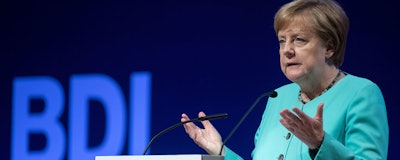
BERLIN (AP) — Chancellor Angela Merkel vowed Tuesday to seek a broad agreement on trade at next month's Group of 20 summit and told German business leaders that she won't give up on a free-trade deal between Europe and the U.S.
Merkel will host leaders of the G-20 powers in Hamburg on July 7-8 amid widespread concern over the Trump administration's "America first" approach to trade. In a speech to an annual German industry congress, she stressed the need to persuade others of the advantages of open markets and free and fair world trade.
"We will do everything to achieve as broad an agreement as possible on this in Hamburg," Merkel said. "In view of the new American administration that isn't easy, but we must make the effort nonetheless."
President Donald Trump has pulled the U.S. out of a trade agreement with Pacific nations. Prospects for a planned U.S.-European Union deal, the Trans-Atlantic Trade and Investment Partnership, also look poor.
Merkel, however, insisted that it offers a chance to set "common standards that others in the world wouldn't be able to get around so easily," given that a U.S.-EU accord would cover about 30 percent of world trade.
"I will continue to push for us to move forward here, for us not to put the project on ice but to try to take further steps," she said.
Trump has criticized Germany for its sizeable trade surplus with the United States, and Berlin also has faced criticism from other European countries.
Merkel renewed her defense of her country's record, arguing that imports and exports shouldn't be viewed "in isolation" as German products often include parts from elsewhere in the EU, helping boost productivity elsewhere.
German direct investments in the U.S. are almost 10 times higher than U.S. companies' investments in Germany, she added — "a lot of jobs in the United States depend on this, but this is also a contribution to world trade because, of course, there are also exports from the United States."
Merkel reiterated her openness to considering deep reforms of the eurozone advocated by new French President Emmanuel Macron, but said the bottom line is whether changes increase prosperity and indicated that Germany stands by its aversion to pooling financial liability.
"Of course we can think about a common finance minister if the conditions are right and if we do not communalize (debts) in the wrong place," she said.
"We can certainly think about a euro budget if it is clear that we really strengthen structures and do things that make sense," Merkel added. "We shouldn't say what is not possible; we should simply consider what makes sense."






















